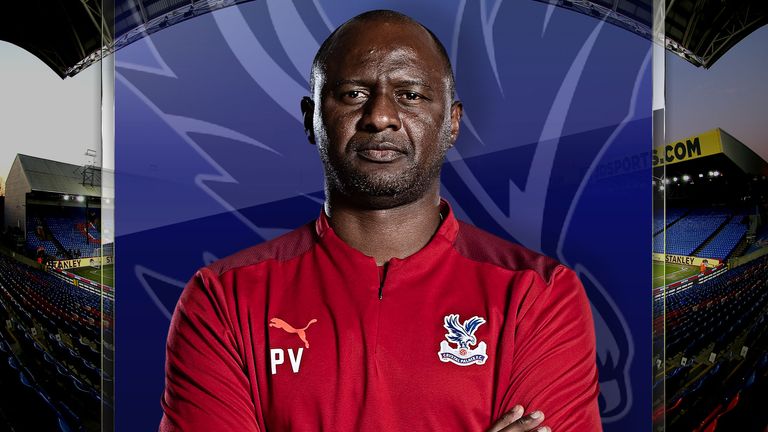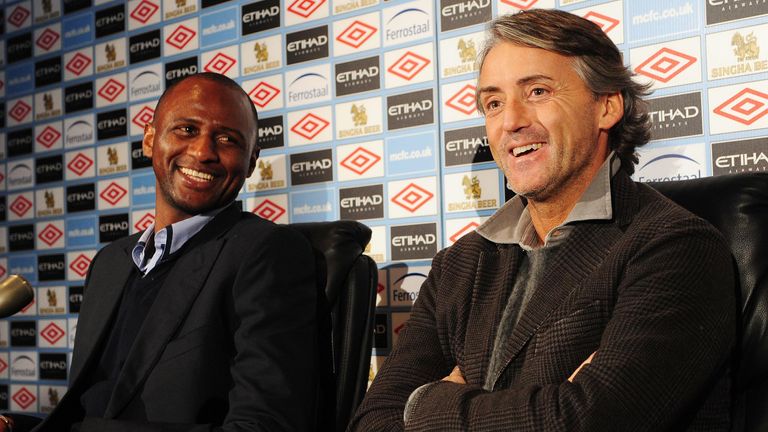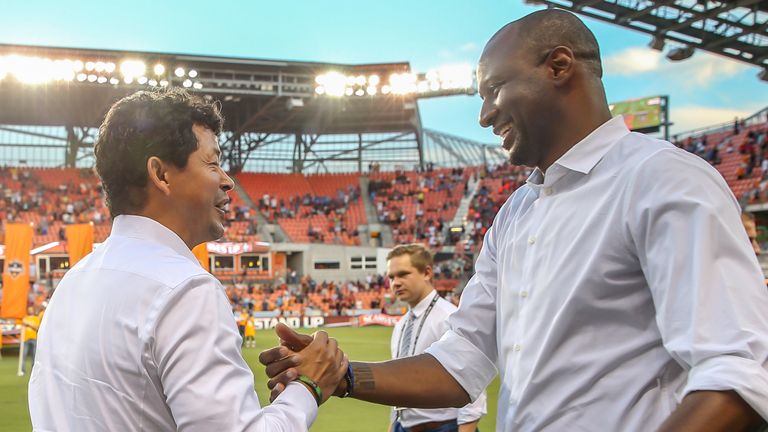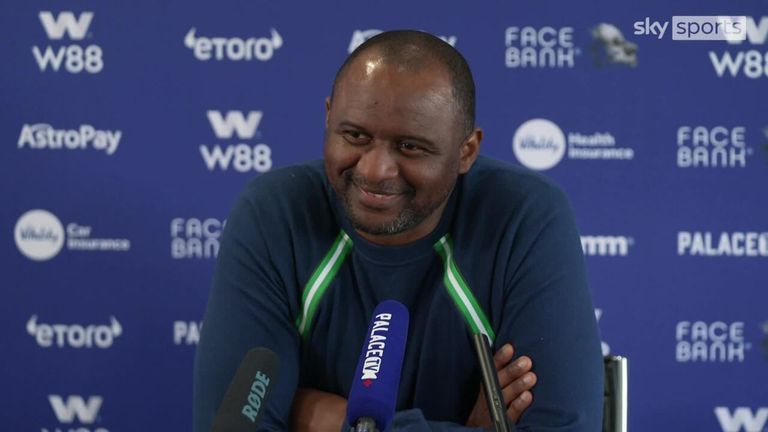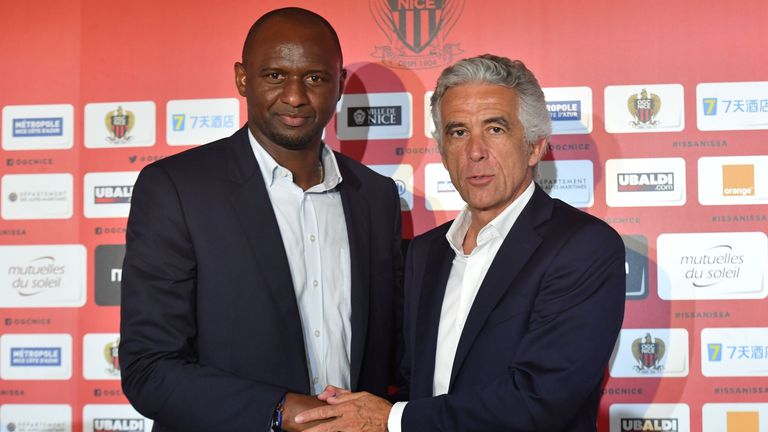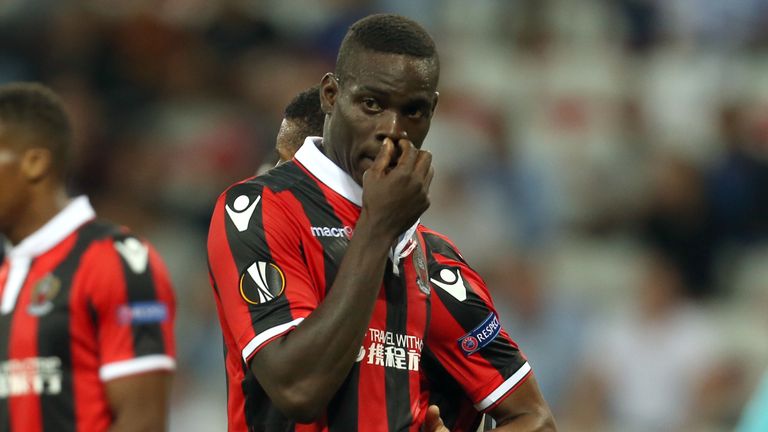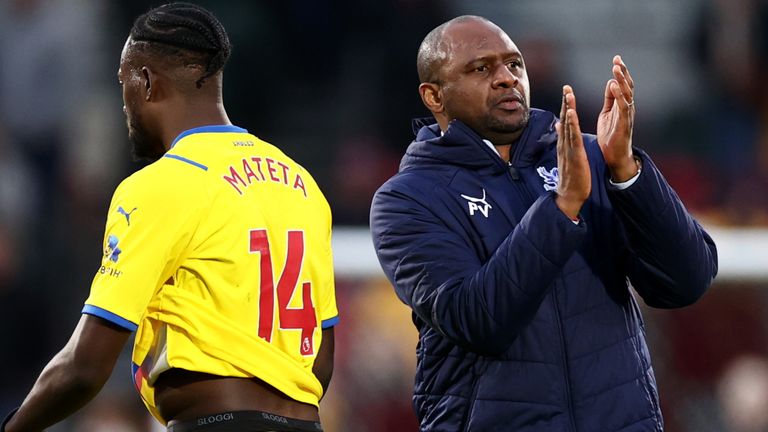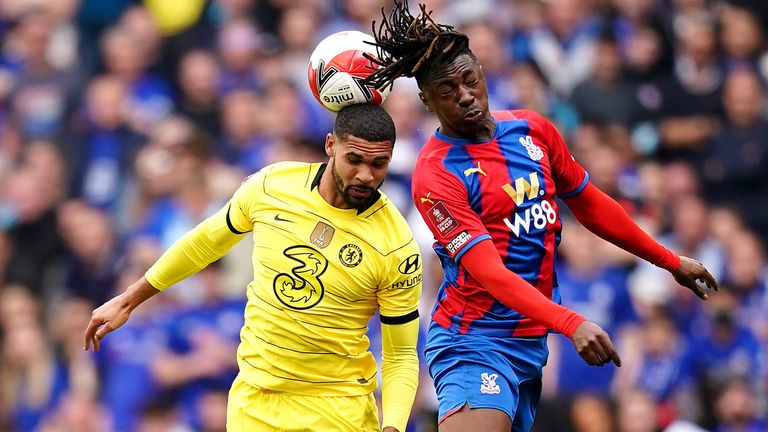Patrick Vieira exclusive interview: Crystal Palace boss on studying Jorge Sampaoli and coaching Mario Balotelli on his management journey
Patrick Vieira tells Sky Sports about finding his coaching identity: "I didn’t want to be another Capello, another Wenger, or another Mourinho"; watch Crystal Palace vs Leeds live on Sky Sports Premier League from 7pm on Monday; kick-off 8pm
Monday 25 April 2022 18:29, UK
It is the morning after Patrick Vieira was inducted into the Premier League's Hall of Fame. The ceremony, held in central London, stirred memories of his glittering past. "A lovely evening," he smiles. But these days he doesn't allow much time to reminisce.
In a quiet corner of Crystal Palace's Beckenham headquarters barely 12 hours later, his focus has already switched back to management. Vieira, a World Cup winner and three-time Premier League champion as a player, is now making his name in the dugout.
His first season in charge of Crystal Palace has brought memorable highs. Victories over his former clubs Manchester City and Arsenal. A trip to Wembley for an FA Cup semi-final. And all with a young, hungry team playing exciting, imaginative football.
On Monday, they host Leeds aiming to extend a five-game unbeaten run at Selhurst Park. For Vieira, the meeting with Jesse Marsch, a manager he faced numerous times while at New York City, is also a reminder of the coaching journey that got him here.
- Vieira, Rooney latest to be inducted to Hall of Fame
- Preview: Crystal Palace vs Leeds live on Sky
- Get Sky Sports for your home | Get NOW
'I used to say coaching wasn't for me'
Vieira didn't want to be a manager.
Or at least, he didn't think he wanted to be a manager.
"It wasn't something that I was planning, to be honest," he tells Sky Sports. "When I was playing, I used to say coaching wasn't for me, that I wanted to do something else. It was not in my head."
Instead, it was something others saw in him.
"When I retired from playing at Man City, Brian Marwood, who was sporting director, and Garry Cook, the chief executive, wanted me to stay at the club to use my experience," he says.
The problem was that Vieira wasn't sure how.
"In the end, they said, 'Let's take two years as an ambassador. You will spend a little bit of time everywhere in the football club and see what you are most comfortable with and what you want to do'.
"When I thought about it, I realised it was a fantastic opportunity."
Vieira shadowed Marwood. "I followed him around," he says with a smile. He worked closely with Cook too. "I went with him to meet players, to discuss things with agents." There was a placement with the club's financial department. Another in City's foundation.
But it was during a spell in the club's academy that something clicked.
"I realised that what I liked most was being with the players," he says. "The way they looked at me, the way we talked to each other, the advice I was able to give them. Those were things that I loved."
Vieira resolved to take his coaching badges - "that was the next step," he says - and opportunity knocked when, just as his ambassadorial role was coming to an end in 2013, manager Roberto Mancini and his coaching staff were sacked, opening up a vacancy with the club's U23s.
"Attilio Lombardo was the manager of the reserve team under Mancini but they decided to make a change and asked me if I wanted to take over," says Vieira. "They explained I would have people around me to support me and I decided to go for it."
'New York City experience shaped me'
Vieira enjoyed his time with City's U23s - the make-up of his Crystal Palace side now shows his commitment to youth endures - but it soon became clear he was ready to step up to a senior role.
In late 2015, having completed his coaching badges with the Welsh Football Association under technical director Osian Roberts, who has since become his assistant at Palace, it was announced Vieira would be taking over at New York City.
The move across the Atlantic appeared an unusual one - especially given the newly-formed New York City had only been inducted into MLS a year earlier. But Vieira didn't hesitate. He knew the conditions would be perfect for his development as a coach.
"It was an easy decision because New York City was part of the City group, so I knew what I was going into, and I knew I would have the support that I needed in terms of staff," he says.
Vieira oversaw steady improvement across his two years in charge, finishing fourth, then second in the overall MLS standings, but crucially, the experience also allowed him to develop his identity.
"I had the chance to play under some of the best managers around during my career and of course I learned a lot from them," he says.
"But I didn't want to be another [Fabio] Capello, another [Arsene] Wenger, or another [Jose] Mourinho, trying to copy what they used to do or say, because I knew that wasn't going to work.
"I wanted to have my own identity and a personality as a manager, and to be really clear about the details I want from players. That's why that experience at New York was massively important to me.
"It allowed me to find out what type of manager I was going to be, and what type of football I was going to develop.
"I tried a lot of different things - some worked, some didn't work - and I couldn't have done that if I'd been at a team in Europe.
"Being surrounded by the City family, I will say, allowed me to make those kind of mistakes."
Collaboration was key and it still is. Vieira was able to bend matches to his will in his playing days but fundamentally he was a team player. He has taken that same mentality into management.
He knows the importance of empowering his staff having been surrounded by analysts and specialist coaches during his time in the City group and he sees the value in working closely with a sporting director too - just as he now does with Dougie Freedman at Palace.
"I knew when I went into coaching that the era of being a manager who ran everything like Arsene Wenger was over," he says. "As a player, I had been to different clubs where there were people around the manager, like sporting directors.
"That is how I grew as a player, having this kind of structure. Arsene was exceptional. In England, it was a culture where managers were coaching, managing, buying and selling players. But outside of England, the majority of clubs had different structures.
"Now, most clubs here are the same, with sporting directors, and that's good because I believe what is important for coaches and managers is to concentrate on what's going on on the pitch, and to have a clear idea about how they want the players to play."
Vieira was able to develop his own ideas about how he wanted to play in New York and he was helped by the scheduling of the MLS season, which runs from February to October, freeing him up between November and January.
"I was able to come back to Europe during the European season, which was my off-season, and spend time with coaches and managers whose teams I loved watching play," he says.
"I have always had a passion and a love for the game in general, but particularly teams who try to play, and teams who try to have possession.
"I spent time at Sevilla when Jorge Sampaoli was there. I went to Bayern Munich when Pep [Guardiola] was in charge. I went to Roma under Rudi Garcia.
"I looked at other managers, how they prepared the week on the training ground, and how they coached their teams.
"That was really good for me because it clarified my ideas about how I wanted to coach.
"I did two and a half years in New York and I loved every single day of that experience. But I always wanted to get back to European football. At that point, I felt I was ready for it."
'Nice was a good learning process'
From New York's Bronx to the French Riviera, Vieira took his first managerial job in Europe when he was appointed as Lucien Favre's successor at Ligue 1 side Nice in 2018.
Like in New York, there would be steady improvement - a seventh-placed finish in his first season, a fifth-placed finish in his second - but this time it wasn't enough to meet expectations.
A change of ownership made for difficult circumstances and the instability showed on the pitch. Vieira was sacked three months into his third campaign, in December 2020, with Nice 11th in Ligue 1.
"Nice had different challenges," he says. "When you go into a managing role, you always have to build a team to perform, but you also have to build relationships. Relationships with the fans, with the media, with the sporting director, with a lot of different people.
"You have to build bridges from yourself to others around the club and, in Nice, I learned how difficult it is to build those relationships with everybody at the same time."
Vieira seems to have fared better on that front at Palace.
He is popular with fans and players alike and has clearly bonded with staff members too, casually chatting to canteen workers while waiting for a coffee before this interview, and warmly greeting Freedman - "I'll see you this afternoon," he smiles - when passing him on the stairs.
The atmosphere was different at Nice, Vieira admits, but he defends the side's performances during his tenure and reflects on the experience as an overwhelmingly positive one.
"At the time, what we did on the field was quite interesting, considering the turnover of players we had and the young players that we brought into the team," he says.
"But, around that, came a difficult situation about selling the club, not selling the club, buying the club, not buying the club. It was a lot to deal with but, for the time, I would say it was a really good learning process for me."
It provided a lesson in man-management too.
Vieira had already handled complex dressing-room dynamics at New York City, where superstars Frank Lampard, Andrea Pirlo and David Villa earned vastly more than their team-mates. But nothing can prepare you for the task of trying to get the best out of a mercurial talent such as Mario Balotelli.
"I played with Mario for a couple of years," Vieira says with a smile. "He was a kid when I was Inter and then I played with him again at Manchester City.
"He's a lovely guy and I love him but of course, it was challenging to coach him at Nice because it was very frustrating to see so much talent wasted.
"As a manager, you try to get the best and the maximum out of every player, and it was really difficult to do that with him. It was frustrating, of course, that I wasn't able to do that with him, but he's somebody that I'll always love."
Vieira speaks fondly of Balotelli but he had to put their friendship to one side at the time, instead demonstrating his ruthless side as the striker's contract was terminated just six months into his tenure.
"I think it's massively important for a manager to connect with his players but having a good relationship with them doesn't mean I have to agree with them," he says.
"Players need to understand it's not about me or them, it's about the football club. It's about working together to create something positive and be successful for the football club.
"What is really important for me is of course to have a good relationship with the players, but also to have an honest relationship with them. So, to hit them when they do something wrong, or to hug them when they do something good.
"I don't have any issues or problems with doing either of those things when it's right to do it. Of course, there will be difficulties in any job because what players want is to play, and when they don't, it can be tough. But honesty is vital."
'Why I love family club Crystal Palace'
The mood had soured at Nice by the time of Vieira's departure but there is a warmth around Crystal Palace, and a level of intimacy, both at Selhurst Park and at the training ground, that you don't get at many Premier League clubs.
Vieira has tapped into it.
"What I really love about this football club is that it's family-orientated," he says. "It's still a small club where everybody crosses everybody else's path and everybody knows everybody else's name.
"Everybody is caring and supporting and as long as we can keep that, it will be the spine of the club that we build around.
"If the players we have brought in this season have had success, that is why. It is because they have felt the love and the support of the people around them. That has put them in a comfortable zone where they can just go and express themselves.
"I believe that when a player is in a happy place, you have more chance to maximise his potential and we have done that well with the players we brought in during the summer."
On the outside, it may look as though little has changed. Palace sat 14th at the time of Roy Hodgson's departure and they sit 14th now. Under Vieira, though, they are an altogether different proposition; vibrant, attack-minded and brimming with potential.
"The danger in football is that people get really influenced by the results and by the league table, but if you are only focusing on that, you can be in big trouble," says Vieira.
He prefers to look at the bigger picture but he is grateful that his squad bought into the change of style he put in motion at the start of the season - "it was risky, but the players were fantastic" - and also that he has been able to lean on Freedman, himself a former Palace manager and player.
"When you have people at the club there to support you, you have to listen to them," says Vieira. "Dougie was massively important to me at the beginning because he knew the players better than I did.
"So when he was talking about [Joel] Wardy, about Luka [Milivojevic], and about what guys like that could give to me and the club, he was spot on with those kind of things.
"Those players were really, really good, because when you are used to doing things a certain way - and there are no right ways or wrong ways - it can be difficult to change, but they did that."
Is Vieira plotting more change this summer? Palace freshened up their squad with six new signings aged 25 or under last year but he believes the foundations are already in place this time around.
"We want to improve the squad but there are not going to be 10 new signings," says Vieira. "What is really good about this club is that we want to be sustainable, so we are not going to change six or seven players every year.
"We have young players who hopefully will be here for a long period of time and we want to build this club with them.
"The longer they stay with us, the better the club will be and the better they will be as players. That is how we want to improve."
It is how Vieira wants to improve too.
"I think as a manager, you are always learning every day, about players, about yourself, about how you manage games, about decision-making," he says.
"Of course, I am in a better place now than I was at New York, or even at the start of this season. My experiences have made me a better manager. They have given me more certainty about what I want."
Crystal Palace are reaping the rewards.
Watch Crystal Palace vs Leeds live on Sky Sports Premier League from 7pm on Monday; kick-off 8pm

